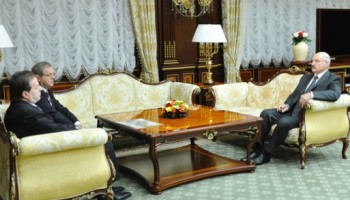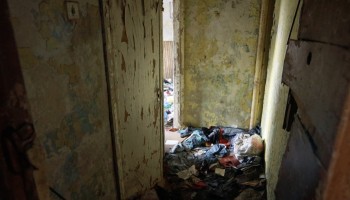When the Minsk City Council announced the winner of an architectural competition in 2008, the plan for the futuristic project was ambitious. Glass towers twisted like corkscrews, enveloping a 300-meter-high skyscraper, while Venice-style gondolas cruised a canal between residential blocks.
Christened the Minsk Lighthouse, the winning design promised administrative and cultural buildings, as well as a “green zone” and Europe’s largest water park. But all there is to show for the visionary project today are high-rise cinderblock apartment buildings that blend in with much of the Belarusian capital.
The winner of the competition, Zomex Investment, was owned by a family of Serbian businessmen with close ties to Belarus’ strongman president, Alexander Lukashenko. Zomex received huge tax breaks and state resources to support the construction, and was granted free land in the center of the city through a presidential decree.
Multiple projects by Zomex and two affiliated companies — Dana Astra and Belinte Robe — have followed the same pattern: big promises and generous government support for ambitious plans that never materialize. Despite the companies’ repeated failures to deliver on commissioned projects, they keep getting contracts.
When reporters analyzed land registry records, they found that Zomex (which recently changed its name to Emirates Blue Sky), Dana Astra, and Belinte Robes currently have at least 11 construction projects around Minsk. The three companies are the largest developers in the city, and have together been given over 400 hectares of land, valued at about US$1 billion.
Reporters also discovered that the owner of those companies performed a secretive corporate maneuver that allowed him to continue profiting from sweetheart deals with Lukashenko’s administration, while dodging sanctions imposed by the European Union.
Until late last year, all three firms were owned by Dana Holdings. That company is registered in Cyprus and until recently was owned by Nebojsa Karić, a member of a wealthy and influential Serbian family that has extensive business interests in Belarus.
In December 2020, the European Union blacklisted Dana Holdings for “benefitting from and supporting” the Lukashenko regime, which has drawn international ire for brutal crackdowns on peaceful protesters rejecting a rigged vote and demanding fair elections.
The Karić family may have anticipated the EU’s move. Just days before the sanctions were announced, Dana Holdings was removed as the owner of the three property development firms and replaced by a company registered in the United Arab Emirates called Enterprise Developments Holding Limited.
The director and owner of Enterprise Developments is Mostafa el-Tobgy, according to company registration documents obtained by reporters. In 2013, a Dana Holdings advertisement on the popular Belarussan news site TUT.by identified a man named Mustafa Al Tobgy as an executive director of Dana Holdings.
Technically no longer owned by Dana Holdings, the Karić companies are now able to skirt EU sanctions and continue to cash in on their connections to Lukashenko.
Asked about this change in ownership, Vibor Mulić, chairman of the board of Dana Holdings, replied: “All the decisions prior to the sanctions such as changes in ownership were purely for business reasons and were made much earlier.”
He declined to comment on the sanctions levied on Dana Holdings, noting that the company was in the midst of a legal appeal against the decision.
He denied the Karićs had a privileged relationship with Lukashenko.
“There is only a relationship between Dana Astra and the National Olympic Committee,” Mulic said, referring to the firm’s sponsorship of Belarus’ Olympic committee, whose vice president is Lukashenko’s son.
From Communism to Kleptocracy
For over a decade Belarus has been encouraged by international institutions like the World Bank to move away from the state-run economy enshrined during Soviet times. But instead of a market economy, what has emerged is a system of crony capitalism that benefits well-connected private firms. Top public officials, or their proxies, are granted privileged access to entire industries, and move wealth out of the country using offshore companies.
Construction has become one of the most lucrative businesses in Belarus. In 2011, more than half of residential real estate projects in Minsk were still controlled by state-owned corporations. By 2020 private companies were building 90 percent of new projects in the Belarusian capital, according to Minsk-based real estate expert Natalya Litovskaya.
Most of the benefits of this boom have accrued to just three companies: Zomex Investment, Dana Astra, and Belinte Robe. Their owners, the Karić brothers, have reaped the rewards of their relationship with Lukashenko, who has ruled Belarus since 1994, and is no longer recognized by the EU as the country’s legitimate president.
Members of Serbia’s Karić family forged ties with Lukashenko after political rivals in their home country began investigating their businesses in the mid-2000s. Prosecutors accused the Karićs of unfairly profiting from their privileged position under the regime of Slobodan Milošević, but later dropped charges against them.
In 2009, Nebojsa’s uncle, Dragomir Karić, invited Lukashenko to an economic forum at the Serbian mountain resort of Kapaonik. A year later, Dragomir was appointed to lead the construction of a large development in the Belarusian capital called Minsk City. The project was later taken over by Karić’s company, Dana Astra.
The president’s daughter-in-law, Lilia Lukashenko, was listed in company documents in 2017 as one of the deputy directors of Dana Astra, though a spokesman for the Karićs said she no longer works there. (She did not respond to a request for comment.) Dana Astra has also enjoyed free advertising in state media, including television news programs that highlighted apartment sales.
The political connections the Karićs enjoy in Belarus have been hugely lucrative.
Zomex’s net profit for 2019 was more than $35 million, with a profit margin of 61 percent, much higher than the industry average. Earnings for 2020 show an even higher profit margin of 67.5 percent, and about $22 million earned. According to its arrangement with the government, Zomex pays no taxes on its earnings.
Despite all the advantages it enjoys as one of the regime’s favorite developers –– or maybe because of them –– Zomex has consistently failed to deliver on its proposals. The Minsk Lighthouse competition was no exception.
Slide to compare: Minsk Lighthouse today looks very different from Zomex’s winning design.
In 2014, the government gave Dana Astra land through a presidential decree to develop “Minsk World,” another commercial and residential area –– the biggest land giveaway to any company in Belarus. The firm received some 300 hectares, worth around $800 million, as well as unprecedented tax breaks, and the use of the city’s resources for the project’s infrastructure.
The justification for such preferential terms cited the developer’s ambitious promise: the construction of an International Financial Center that would attract foreign investors to Belarus. To date, all that exists of Minsk World are concrete apartment buildings.
Mulić, the Dana Holdings chairman, said the company inherited the incentives that were built into a previous contract with a Russian company that backed out of the project. “All the incentives are awarded based on the investment laws of the Republic of Belarus after negotiations with the Minsk City Executive Committee, the Ministry of Architecture, and other relevant bodies,” he added.
Slide to compare: Dana Astra promised to build a modern International Financial Center at Minsk World, but very little of the project has been realized.
Like the condos of Minsk Lighthouse, the ones at Minsk World are financed with “residential bonds,” purchases of unfinished homes in exchange for a significant discount. Between 2016 and 2018, Dana Astra, the developer of Minsk World, issued residential bonds on eight occasions, raising a total of around $20 million.
Emirates Blue Sky (previously Zomex) also issued bonds that used commercial real estate as collateral. A sizable portion of these were purchased by BPS-Sberbank, a Belarusian subsidiary of the Russian state-owned financial giant Sberbank. As of 2020, the bank had bought registered bonds from Emirates Blue Sky worth $140 million — nearly half the company’s assets. Belgazprombank, another Russian-owned bank, has lent Emirates Blue Sky over $55 million through bond purchases.
Dana Holdings companies also landed smaller, yet no less lucrative, projects.
Zomex received another plot of land to build residential housing at Park Chaluskincau, a largely forested tract of about 78 hectares near the center of Minsk. The nearly 26-hectare parcel is worth about $80 million, according to figures compiled by journalists from the land registry.
Dana Astra received land to build 14 smaller residential blocks. One closed community of luxury villas featured a gold-plated statue of Sreten, one of the Karić brothers, who died in 2017. (It was taken down after residents protested.) The company also constructed two shopping malls, where it leases spaces to businesses, including an art gallery run by Lilia Lukashenko, the Belarusian president’s daughter-in-law.

While Dana Astra said Lilia Lukashenko no longer works for the company, she is still listed as director of Art Chaos, a gallery located in Dana Mall. Art Chaos is owned by Danlance Holdings, a Cyprus company previously owned by Dana Holdings and now listed as an affiliate in their financial documents.
Paintings produced by local artists, and purchased through Art Chaos, grace the walls of condos sold by the Karić brothers.
Lilia Lukashenko declined to speak to reporters when they visited the gallery in April. She was busy showing art to a small group of guests, alongside Bogoljub Karić.
Serbian Chronicles
The success that members of the Karić family have enjoyed in Belarus appears to have been modelled on their playbook from Serbia, where they cultivated close ties with the ruling regime.
The family had profited handsomely under Milošević, the Serbian leader who was president of Yugoslavia, and oversaw the violent break-up of the former country. But in 2000, Milošević was brought to trial in The Hague for war crimes, and members of his government were hit with sanctions. Five members of the Karić family were also placed on the EU and U.S. travel ban lists.
The new Serbian government drafted a new law to collect taxes on “extra profits” from the small group of companies and individuals who enjoyed special advantages during the previous regime. At the top of the list was the Karić family, which ended up paying 35 million euros in taxes on its “extra profits” in 2004, after the law was passed.
The same year, Bogoljub Karić unsuccessfully ran for president representing a party he founded called the Strength of Serbia Movement, which holds a center-right, pro-business platform.
In 2006, prosecutors launched investigations into the family’s businesses. Sreten and Bogoljub Karić fled the country, escaping arrest warrants on charges of tax evasion, mismanagement of millions of dollars, and money laundering.
Details of the allegations against Karić family members were found in documents from three investigations obtained by reporters.
The brothers, Bogoljub, Sreten, Dragomir, and Zoran Karić, as well as their sister, Olivera Nedeljković, were suspected of illegally transferring money from Mobtel, a telecom company they co-owned with the state, to their own private firms. Prosecutors alleged that the siblings managed to move more than 60 million euros out of Mobtel through various forms of fraud, including fictitious contracts and invoices, and spent millions more on personal expenses.
(The Dana Holdings chairman said the investigations were “revenge” by the prime minister at the time for Bogoljub Karić’s support of a different political candidate.)
Serbian authorities issued international warrants for Bogoljub and Sreten Karić, who bought time in Russia and Belarus, waiting for the political climate to change.
The political winds turned in their favor when Milošević’s allies returned to power in the 2012 elections. Bogoljub Karic’s Strength of Serbia Movement was now part of the new coalition government. While Bogoljub was still on the run from Serbian authorities at the time, his wife, Milanka, and brother, Dragomir, were both elected to the parliament.
The cases against Bogoljub and Sreten Karić remained open for a time, despite their new politically powerful allies. In 2013, Serbia’s president at the time, Tomislav Nikolić, even laid the symbolic cornerstone for the Minsk Lighthouse project during a state visit to Belarus. Two years later, according to Belarusian media, Nikolić met with Bogoljub Karić in Minsk and, together with President Lukashenko, laid the cornerstone in the foundation of Minsk World.
Nikolić said that he also met with Bogoljub Karić in Russia in 2016, where he told the businessman that he could not influence the judiciary in his favor.
However, all three cases against the Karić brothers were closed later that year. A court suspended proceedings in one case, citing an expired statute of limitations, while prosecutors claimed a loss of evidence in one investigation, and the submission of exculpatory evidence in another.
In December 2016, a decade after they had fled their country, Sreten and Bogoljub triumphantly returned to Belgrade from Minsk on a private jet. During their self-imposed exile, they had forged a lucrative relationship with the Belarusian president.
In 2019, when Lukashenko made an official visit to Serbia, he was accompanied by Dragomir Karić, who serves as a member of parliament as well as Belarus’ honorary consul in Belgrade.
At a press conference following his meeting with Serbian President Aleksandar Vučić, Lukashenko recalled welcoming the Karić brothers to Belarus after they fled charges in their homeland, and he praised the success of Dana Astra.
“It is one of the most successful and one of the richest companies on the planet, which is creating miracles in construction,” Lukashenko said.
Correction: This story initially misidentified the type of bonds purchased by BPS-Sberbank. They were registered bonds backed by commercial real estate.






